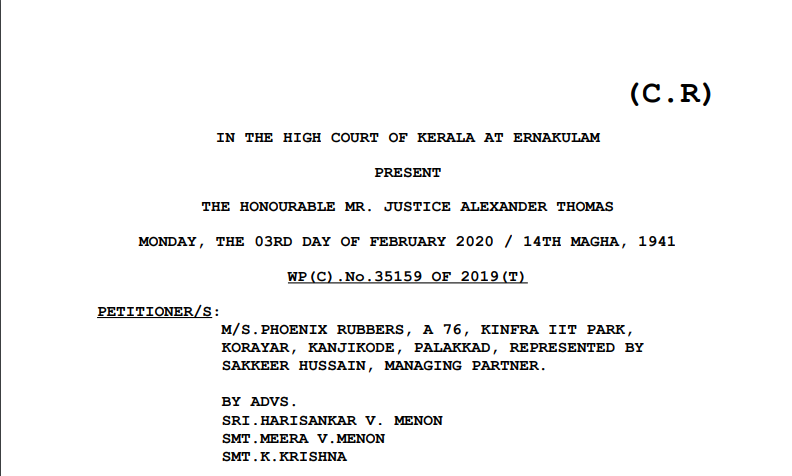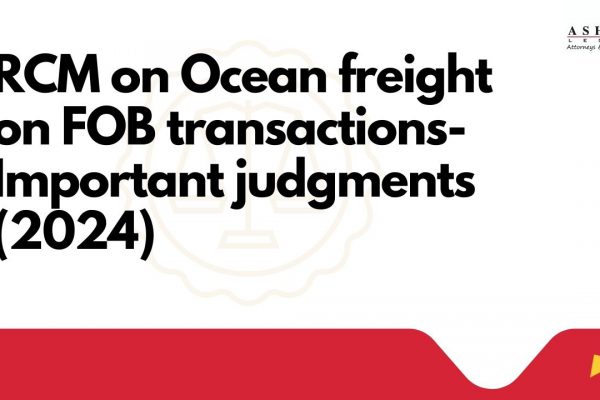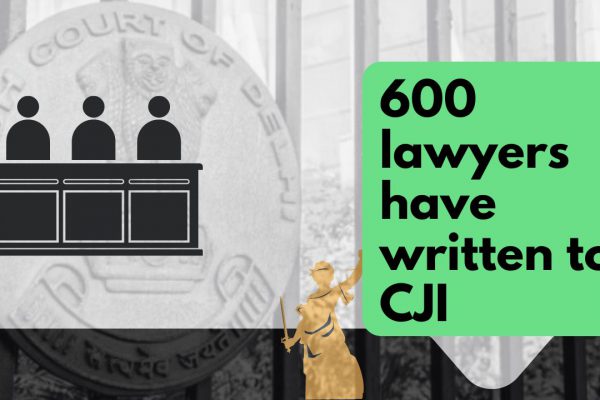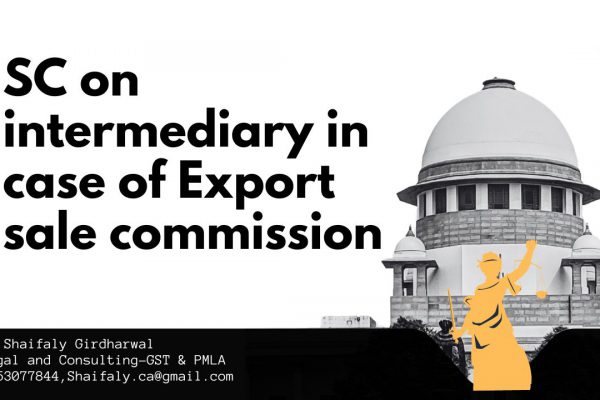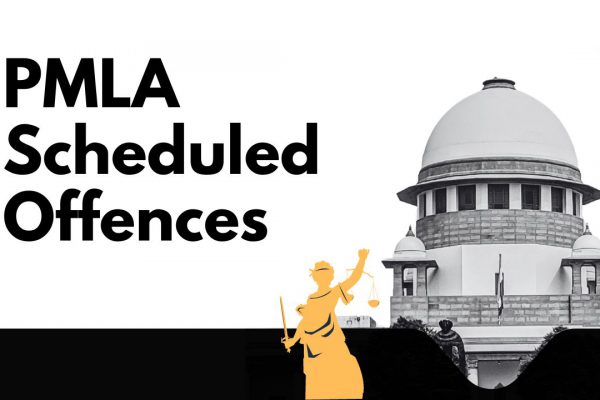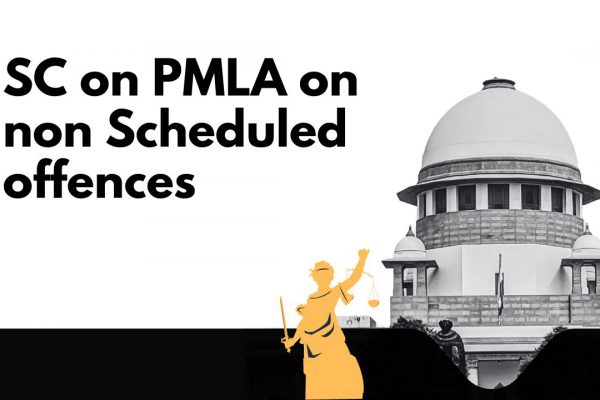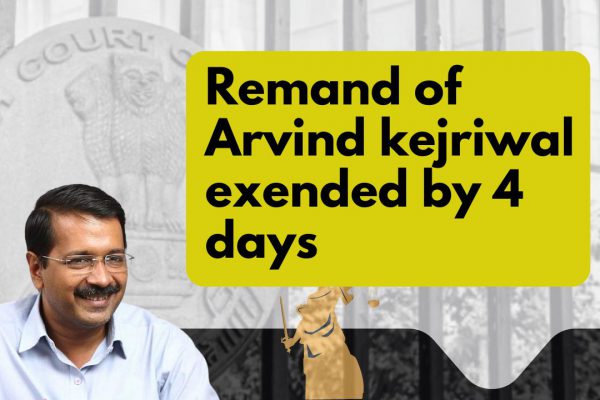GST Registration can be Cancelled for not Furnishing Returns for a continuous period of Six Months: Kerala HC
Case Covered:
M/S.PHOENIX RUBBERS
Versus
THE COMMERCIAL TAX OFFICER
Read the full text of the case here.
Facts of the case:
The factual aspects stated in this Writ Petition (Civil) are as follows:-
That the petitioner is an assessee of goods and services tax on the roll of 4th respondent. That on account of the financial crisis, the petitioner firm defaulted filing of returns from May 2019 onwards. Thereupon, the 4th respondent had issued Ext.P-1 notice dated 13.1.2019 to the petitioner proposing to cancel the registration under Sec. 29(2)(c) of the CGST Act on account of the alleged non-filing of the returns for a continuous six months’ period. Thereafter, the 4th respondent has passed the impugned Ext.P-3 order ordering the cancellation of registration of the petitioner firm under Sec. 29(2) (c) of the CGST Act. The petitioner would point out that the abovesaid provision contained in Sec. 29(2)(c) of the CGST Act provides cancellation of the registration only if there is continuous default of six months in filing the returns. The main contention urged by Sri. Harisankar V.Menon, learned counsel appearing for the petitioner is to the effect that though the 4th respondent found that as on the date of Ext.P-1 notice dated 13.11.2019 there were six months’ continuous default on the part of the petitioner, that indeed there was only 5 months’ continuous default and not the mandatory six months’ continuous default in filing the returns as envisaged in Sec. 29(2)(c) of the CGST Act. Therefore, the impugned order is illegal and ultra vires and is liable to be interdicted by this Court. Further, it is pointedly pointed out that the impugned Ext.P-3 order directing cancellation of the registration of the petitioner was rendered on 10.12.2019 and that on 10.12.2019, the petitioner had filed returns for the month of May 2019 as can be seen from Ext.P-2 document.
Observations of the court:
Sri. Sree lal N.Warrier, the learned Standing Counsel for the Central Board of Indirect Taxes, Government of India, appearing for respondents 2 and 4 were requested to get factual instructions on this aspect. Today, when the matter has been taken up for consideration, it is pointed out that the petitioner has filed returns for the month of May 2019 on 10.12.2019 as per Ext.P-2 series and further that the petitioner has never informed the 4th respondent on 10.12.2019 about the factum of filing of the return for the month of May 2019 on 10.12.2019.
This Court would certainly say that the 4th respondent cannot be faulted for having passed an order in the nature of Ext.P-3 on 10.12.2019, because he was totally unaware that the petitioner would indeed file a return for the month of May 2019 on 10.12.2019, etc.
Rule 22 of the CGST Act reads as follows:
“Sec.22: Persons liable for registration.–
(1) Every supplier shall be liable to be registered under this Act in the State or Union territory, other than special category States, from where he makes a taxable supply of goods or services or both if his aggregate turnover in a financial year exceeds twenty lakh rupees:
Provided that where such person makes taxable supplies of goods or services or both from any of the special category States, he shall be liable to be registered if his aggregate turnover in a financial year exceeds ten lakh rupees.
(2) Every person who, on the day immediately preceding the appointed day, is registered or holds a license under existing law, shall be liable to be registered under this Act with effect from the appointed day.
(3) Where a business carried on by a taxable person registered under this Act is transferred, whether on account of succession or otherwise, to another person as a going concern, the transferee or the successor, as the case may be, shall be liable to be registered with effect from the date of such transfer or succession.
(4) Notwithstanding anything contained in sub-section (1) and (3), in a case of transfer pursuant to sanction of a scheme or an arrangement for amalgamation or, as the case may be, the demerger of two or more companies pursuant to an order of a High Court, Tribunal or otherwise, the transferee shall be liable to be registered, with effect from the date on which the Registrar of Companies issues a certificate of incorporation giving effect to such order of the High Court or Tribunal.
Explanation.– For the purposes of this section,–
(i) the expression “aggregate turnover” shall include all supplies made by the taxable person, whether on his own account or made on behalf of all his principals;
(ii) the supply of goods, after completion of job work, by a registered job worker shall be treated as the supply of goods by the principal referred to in Section 143, and the value of such goods shall not be included in the aggregate turnover of the registered job worker;
(iii) the expression “special category States” shall mean the States as specified in sub-clause (g) of Clause (4) of Article 279A of the Constitution.”
Sec. 29(2)(c) mandates that power for the cancellation of registration in a case where there is continuous six months’ default on the part of the assessee in filing the returns. Since the competent official is obliged to issue a notice in the nature of Ext.P-1 before he passes final orders, it goes without saying that the requirement of 6 months’ continuous period should be fulfilled both at the time of issuance of the abovesaid notice in terms of the proviso to Sec. 29(2) of the CGST Act read with Rule 22 of the CGST Act, but also at the stage of passing the final order cancelling the registration as per Sec. 29(2)(c). In the instant case, the jurisdictional fact regarding the six months’ continuous default on the part of the assessee is certainly fulfilled at the time of issuance of Ext.P-1 show cause notice dated 13.11.2019. Whereas, the said vital requirement of jurisdictional fact is non-existent as on the date of issuance of the impugned Ext.P-3 cancellation order dated 10.12.2019. If that be so, it is only to be held that the impugned order as per Ext.P-3 is illegal and ultra vires and is liable to be interdicted by this Court. Accordingly, it is ordered that the impugned Ext.P-3 order will stand quashed.
It is made clear that this Court has only decided on the limited aspect regarding the jurisdictional fact required for invoking the power under Sec. 29(2)(c) of the CGST Act and in case the petitioner is liable for any of the manners for the abovesaid Act, or in case the petitioner after the issuance of Ext.P-3 has subsequently defaulted six months’ continuous period in filing returns, etc. then the competent officer concerned is certainly at liberty to proceed in accordance with the law, but certainly after compliance of the basic requirements of fairness and natural justice.
With these observations and directions, the Writ Petition (Civil) stands finally disposed of.
Download the copy:
If you already have a premium membership, Sign In.
 ConsultEase Administrator
ConsultEase Administrator
Consultant
Faridabad, India
As a Consultease Administrator, I'm responsible for the smooth administration of our portal. Reach out to me in case you need help.


